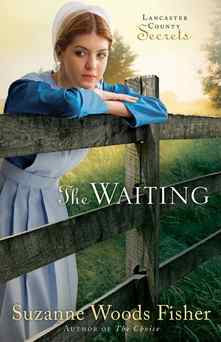 Synopsis:
Synopsis:
It is 1965. Since his parents were tragically killed in a buggy accident, Caleb “Cal” Zook has been running their dairy and farm, Beacon Hollow, as well as looking after his three younger brothers: Ben, Matthew, and Ephraim. Caleb, 30 years old, is married to Mary Ann, and they have a seven-year-old daughter, Maggie.
Ben is serving in Vietnam. Although he told his friends and family that he was tricked by the recruiter, Ben really saw enlisting as his way of escaping his rural Pennsylvania home and seeing some of the world. Matthew has also been called into duty but, as a Conscientious Objector, he will be serving at a hospital in nearby Lebanon, Pennsylvania.
Jorie King, at 24 years of age, is a beautiful, intelligent, and highly opinionated young woman who lives with her grandparents, Marge and Atlee, on their Percheron horse farm. Jorie has been in love with Ben for as long as she can remember. But he did not ask her to marry him before leaving for Vietnam and, in fact, their parting was strained because Jorie told him she would not wait for him to return. That is exactly what she is doing, despite her knowledge that Ben’s wild nature and desire to experience life beyond the bounds imposed by their Amish faith and culture might continue to challenge their relationship with he returns. Jorie loves her life on the farm, and is secure in her identity as a Plain person. In fact, during Ben’s absence, she has even proceeded with her own baptism.
When the Plain people’s philosophy about and approach to education is threatened, Caleb convinces Jorie to accept the schoolteacher position and prepare the eighth grade scholars to pass a state-mandated proficiency examination. If enough of them pass the test, the state will not force them to continue studying in public high schools. Jorie accepts the challenge and begins educating the children using unorthodox methods that bring negative attention from Amish community leaders.
That’s not Jorie’s only controversial decision, though. Spurred by a local bully, none of the English residents of Stoney Ridge will rent a home or office to the new veterinarian, Dr. Robinson, and his pregnant wife. But the Amish do not believe in or practice discrimination. Dr. Robinson comes highly recommended by the other local veterinarian because of his expertise with large animals, so his services as sorely needed by the Amish farmers in the area. When Jorie realizes that the empty carriage house on her grandparents’ farm is perfectly suited to serve as a combination office and home for the Robinsons, Jorie places herself and those she loves in danger by renting it to the African-American couple.
The Zooks suffer two tragedies within a few months’ time that not only test their faith, but set into motion events that will change forever the lives of Caleb and Jorie.
Review:

Fisher is a resident of the San Francisco Bay Area, and graduate of Westmont College in Santa Barbara, California. While her four children were growing up, she worked as a freelance magazine writer. Yet she has distinguished herself as a writer of both fiction and nonfiction works focused upon the Amish. She was initially drawn to the topic because her mother’s family were Old Order German Baptist Brethren (Dunkards). Her grandfather was one of 11 children who taught in a one-room school house in and became one of the first publishers of Christianity Today. His “life inspired me to write,” Fisher relates.
The Waiting is aptly heralded as “a multifaceted story about complex people living the simple life.” Jorie is a compelling character — strong, yet dedicated to her Plain lifestyle; focused upon achieving the goals she sets for herself, yet committed to understanding, appreciating, and accepting the Will of God in her life; and, above all, determined to always act in accordance with the strong ethical and moral principles espoused by the Amish. She has always loved Ben and thought she wanted to be his wife, but she acknowledges her own trepidation in the face of Ben’s restless nature. His wanderlust and dissatisfaction with the limitations placed upon him by the Plain way of living have caused him to make rash, short-sighted decisions. And those decisions have impacted a great many people’s lives, including but certainly not limited to Jorie’s.
Cal and Maggie made hot chocolate and brought it out on the porch to watch the full and creamy moon rise in the evening sky.
“What will it be like in heaven?” Maggie asked Mary Ann as she handed her a warm mug.
“Maggie, how do your hands feel right now, holding on to that warm mug after playing in the cold?”
“Good. But after a while, that good feeling fades away.”
“In heaven, that good feeling won’t go away. That warm, good feeling is like the presence of God, and it will last for all eternity.”
Jorie cannot deny her growing attraction to Caleb, who is also a man of integrity who would never bring dishonor to Jorie or either of their families. In the wake of two great tragedies, Caleb forges on, seeking each day to be grateful for the things in which he believes, especially his little daughter, Maggie. When his sister-in-law, Sylvia, insists that she knows better than Caleb what is right for him and his family, he steadfastly but kindly resists her meddling, and in the face of great peril, he refuses to succumb to the English way of handling disputes.
Matthew, like Ben, finds himself straddling two worlds. He works at the hospital in Lebanon, but returns frequently to Beacon Hollow where he ably assists Caleb with chores. Although he too is somewhat mesmerized by and fascinated with the world beyond Stoney Ridge, he also grows gradually fonder of “Fat Lizzy,” the young Amish woman Caleb hires to assist with running his household.
The story moves at a fast clip, with unexpected plot developments following each other in rapid succession, making it hard to tear oneself away before the book’s end. To reveal too much of the story here would spoil the joy of reading Fisher’s lush descriptions of the beautiful Pennsylvania countryside and her straight-forward explanations of the Amish way of viewing the world, how the Plain folk prepare for and conduct worship, and the manner in which Jorie and the other characters approach the various complications in their otherwise well-ordered lives. The Waiting is a fascinating look at life in another time — the turbulent 1960’s — and among a group of people who were and are dedicated to a peaceful, nonviolent way of living in unison not only with God and each other, but the land and animals they so lovingly care for. Each character is fully formed and imagined, thoroughly believable, and empathetic, especially when torn about how to proceed so as not to hurt more than one person for whom he/she cares deeply. It is refreshing to read about truly decent, well-intentioned people who are grappling with realistically portrayed dilemmas. One of the book’s secondary themes — the Amish revulsion at the bigotry of some of their English neighbors — delivers a powerful message about the Amish’s love and respect for all of God’s creation.
Not only does Fisher offer a glimpse into a way of life with which many readers ave no familiarity, she also proffers strong evidence that, despite lifestyle differences, all are members of the same community.



4 Comments
I reviewed this one on my blog not too long ago! Great book, I liked it… 🙂
Great review, and an even greater book. The Choice is also a terrific book.
Loved your review. I loved both of Fisher’s books. I consider them 2 of the best I have read this year.
Nice! I loved the way you write your review. Great book, too!